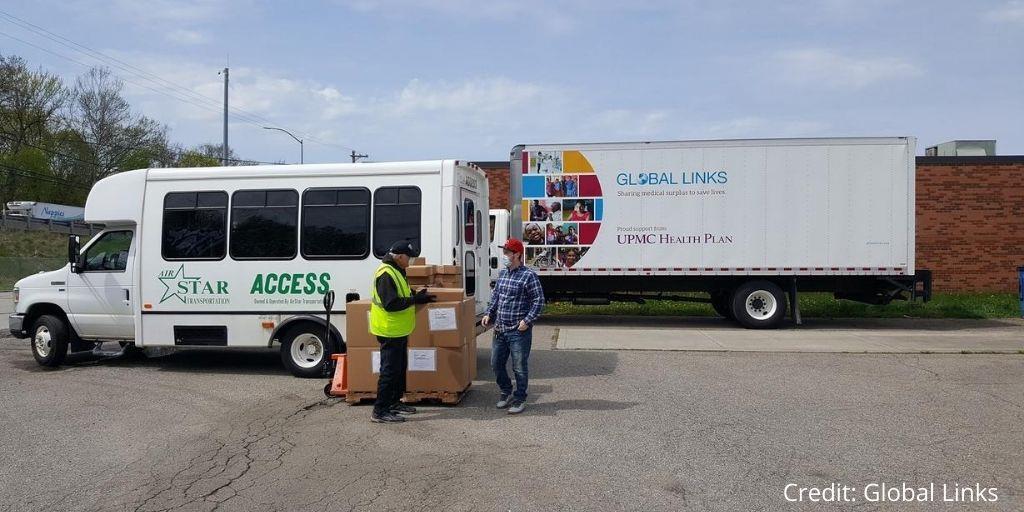
The COVID-19 pandemic has not only affected the physical health of Pennsylvania's seniors, but also impacted their accessibility, mobility, and connection with family and friends.
Beginning in March, Pennsylvanians began limiting travel and staying home to help stop the spread of COVID-19, and transit agencies saw ridership drop as much as 80 percent.
Considering that many seniors rely on these services get to doctor's appointments, to the grocery store, and more, several organizations in western Pennsylvania decided to bridge the gap when shelter in place went into effect.
While Shared-Ride services are available to any Pennsylvanian, they are most used by seniors. Pennsylvania's Senior Shared-Ride program allows people 65 years of age and older to use door-to-door transportation by paying only 15 percent of the fare, and the Lottery Fund pays the remaining 85 percent.
To qualify for the reduced fare, riders must register for service the day before the service is needed and supply one eligible proof of age document, such as a driver's license or photo ID card, to their local shared-ride provider, and place an advance trip reservation.
One of the organizations that had to evolve in response to COVID-19 was ACCESS. The organization did so by collaborating with local community organizations to expand shared-ride and paratransit services in a non-traditional way, offering a glimmer of light in an unprecedented time.
The ACCESS program, which is sponsored by Port Authority of Allegheny County, contracts with five different private companies as well as one non- profit human service agency to provide shared-ride transportation services primarily to people with disabilities, older adults, and clients of human services agencies.
The average shared-ride customer is 81.5 years old with many near 90 years old. Given the age of their clients, ACCESS decided they needed to adapt quickly as the virus began to spread.
ACCESS staff generated a list of about 700 people who had used the service in the last two months and did not appear to be connected to a human services agency. Based on this list, staff conducted wellness check-in calls and asked a series of questions.
These questions ensured that folks had knowledge of COVID-19, correct community resource phone numbers, information on acquiring meals, enough prescriptions, emergency contact information, and the option to receive additional check-in calls. There was also time to "just chat," as people shared their feelings of loneliness surrounding the pandemic.
Additionally, a team of local agencies that included ACCESS, the United Way of Southwestern Pennsylvania, Age Well Pittsburgh, and others joined together to expand these calls to external customers, in hopes of fostering regional social connection even more.
With PennDOT's help, changes in ACCESS' day-to-day services evolved to fit riders' specific needs. Instead of having to call and make reservations ahead of time, customers were able to request same-day ride service. In addition, rather than booking two separate trips, riders could safely travel to places like the ATM, the post office, or senior centers for grab-and-go meals and return home in one trip.
Additionally, in coordination with the United Way, drivers delivered personal protective equipment like masks and gloves to agencies in need, and home-delivered meals and food boxes to community members.
To keep drivers and riders healthy, cleaning and safety policies were updated to help ensure the virus didn't spread. Each driver is required to have masks, gloves, hand sanitizer, and cleaning supplies on board. All high-touch surfaces are cleaned repeatedly throughout the day, and vehicles are then deep-cleaned after each route. Social distancing is strictly enforced.
As soon as ACCESS started requiring masks on all paratransit vehicles, riders received automated calls as a reminder to wear masks in all ACCESS vehicles. If they were unable to get one, they were assisted in doing so.
Through this experience, each organization learned how to be flexible and to change practices when necessary. What remained constant was quality customer service, and teamwork for the greater good of Allegheny County communities.
PennDOT and its partners are committed to ensuring that transportation remains the ultimate connector during the pandemic and beyond.
ABOUT THIS BLOG
Did you know PennDOT is directly responsible for nearly 40,000 miles of highway and roughly 25,000 bridges? We oversee programs and policies affecting highways, urban and rural public transportation, airports, railroads, ports and waterways, in addition to administering the state's more than 11 million vehicle registrations and 8.8 million driver's licenses.
So, how do we do what we do? And how can we help you travel in Pennsylvania — whether it be for business or leisure — in safe and enjoyable manner? Read PennDOT Way to learn more about the department, what we do, and how and why we do it.
TAGS
50-Year Anniversary, 511PA, Aggressive Driving, Airports, Autonomous Vehicles, Bicycles, Bridges, Child Safety, Community Relations, Construction, COVID-19, Distracted Driving, District 1, District 10, District 11, District 12, District 2, District 3, District 4, District 5, District 6, District 8, District 9, DOTcom, Driver and Vehicle Services, Emergency Responders, Employment, Equity, FAQ Friday, Human Trafficking, Impaired Driving, Innovations, Live Free Ride Alive, Maintenance Monday, Motorcycles, Older Drivers, PA Motorcycle Safety Program, Pedestrians, PennDOT Connects, Ports, Public Transit, Railroads, REAL ID, Road MaP, Roadside Beautification, Rural Roads, Safety, School Buses, Seat Belts, State Transportation Innovation Council (STIC), Sustainability, Teen Drivers, Throwback Thursday, Transportation Funding, Travel in PA, Welcome Centers, Winter, Work Smart, Work Zone, Yellow Dot
LATEST POSTS
PennDOT Continues Sharing, Updating Resources for Local Governments to Pursue Bipartisan Infrastructure Law Funding Opportunities
Norwin High School Wins 2024 ‘Innovations Challenge’
Demo Complete: I-95 CAP Project in Center City Philadelphia
PennDOT Archeologist Connects Past, Present, and Future
Lehigh Valley DUI, Highway Safety Task Force Hosts Law Enforcement Seminar
ARCHIVES
2024
2023
2022
2021
2020
2019
2018
2017



